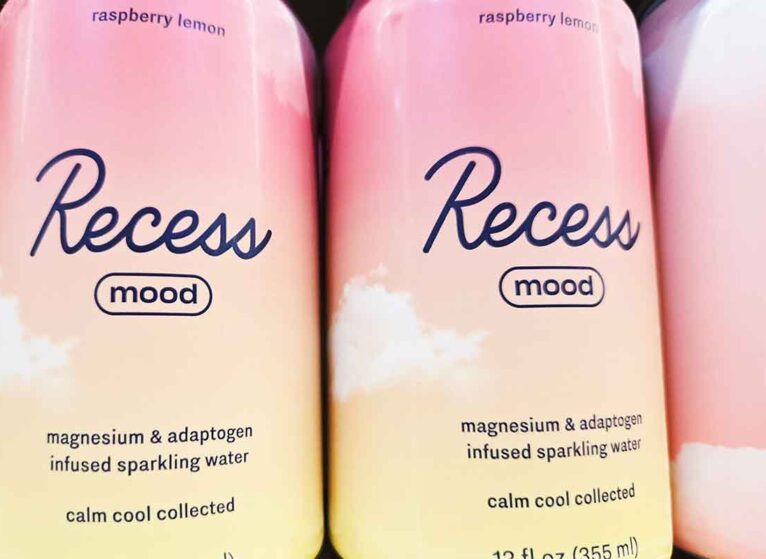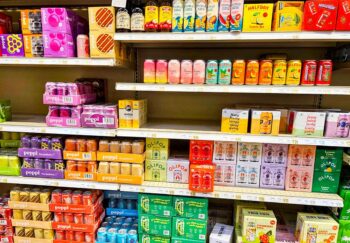As people experiment with alternatives to alcohol, we’ve seen an explosion of products. They appear on our social media feeds and on grocery store shelves. In bright, friendly colors and with fun names, they proclaim their ability to calm, relax, and brighten our moods in all-natural, nonalcoholic ways. But are these mood enhancers truly all that?
Questioning the Labels
From a purely aesthetic angle, Recess is my favorite. Who didn't love recess as a kid? Who doesn't want recess, a break, right now? In soft, nonconfrontational pinks and yellows, hazy clouds float, signaling the whimsy and relaxation awaiting every sip. I'm intrigued.
The thing is, the label glows with confidence. But I'm absolutely not confident that I know what the ingredients mean. (Writing for this blog has taught me to always read the ingredient labels!)
"Sparkling water," Ok. But I don't know why magnesium is in here, or what an adaptogen does. Will these interact with my current medications? Am I at risk for an allergic reaction? Will I really experience an adult-style recess, or is this just an expensive can of water? Should I worry or just chill out with my tasty healthy soda?
Once again, registered dietitian Carole Havrila at UVA Health comes to the rescue, with a few answers to help guide me through the maze of the healthy soda alternative craze.
Mood Enhancers: What's In Them?
A quick review of the most common "calming" ingredients in alternative sodas shows that most of them:
- Are harmless
- Probably don't work - at least, scientific studies don't promise that they do
- Could interfere with other drugs and medications
- Aren't evaluated or regulated by the Federal Drug Administration (FDA), like most medicines
Adaptogens
These botanicals or fungi can help us adapt to stress, by reducing cortisol, the stress hormone. They can also increase cortisol if you don't have enough. Most aren't harmful, as long as you don't overuse or misuse them. "They can make us feel calm and focused," Havrila notes.
Popular Adaptogens in Healthy Sodas to Look For
- Ashwagandha: An herb shown in some studies to help fight stress and help with anxiety and improved cognition. Reduces inflammation. Larger studies need to be done to confirm efficacy. Can cause allergic reactions. Could interfere with some drugs.
- Lion’s Mane: An adoptogenic mushroom. Contain beta glucans and some antioxidant activity that may improve immune function.
- Cordyceps: This fungus grows on the caterpillar of a moth. They're reported to increase stamina and improve immunity.
- Reishi mushrooms: These may support a healthy immune system. Some studies suggest they can lower blood sugar in high doses and lead to excessive blood thinning. Havrila warns, "Take care if you have diabetes or take blood-thinner medications."
Magnesium
An essential mineral for a healthy nervous system and metabolism, magnesium has a reputation for helping with nerves and sleeplessness. But scientific studies don't really back this claim, and because too much magnesium can cause diarrhea, be careful.
- Magnesium L-threonate: Havrila explains that this is "a new form of magnesium for the brain. Animal studies suggest benefits for cognitive function, but there is no evidence in humans."
Do you need to take multivitamins? You might be surprised at the answer.
Chamomile
An herb and popular folk remedy to fight stress and help sleep. Chamomile contains, Havrila points out, "a flavonoid, apigenin, that has anti-anxiety compounds." The list of herbs that calm is extensive and includes St. John's Wort, valerian root, lavender, lemon balm, etc.
Nootropics
"These substances are said to enhance cognitive function in certain ways," says Havrila. Some nootropics you would recognize: Caffeine, nicotine, and amphetamine. Dozens of other stimulants and compounds claim membership, too, like prescription ADHD drugs. Most nootropic supplements that claim to enhance brain function haven't been proven to be true.
L-theanine
An amino acid found in black and green tea and also in some mushrooms. It falls into the nootropic category and can supposedly boost concentration while soothing caffeine jitters. "It has been promoted mostly for relaxation effects that haven’t been proven in scientific studies," Havrila notes.
Kava
Derived from a shrub in Micronesia and Polynesia, this extract's become popularized at bars as a healthy alternative to alcohol. I will attest to having tried kava at one such establishment. The "bartender" told me the drink (served in a coconut shell) would taste "earthy." It did taste like dirt. And it did put me in a kind of hazy, loose mental state.
But be careful; kava has ingredients than can hurt your liver badly. There's also a lot of risk when taken with other medicines, including some antidepressants.
GABA
A chemical in the brain (or neurotransmitter) that interferes with the ability of nerve cells to receive stress signals. Alcohol, kava, and other 'calming' ingredients supercharge GABA. This slows down your nervous system, reducing anxiety, helping you sleep.
The problem is that, as with alcohol, chemicals that calm you down can magnify other medicines you're taking. Ingesting anything in an unregulated manner poses risks.
Mood Enhancers: Do They Work? Are They Safe?
All of the healthy sodas I sampled had different formulations and amounts of mood enhancers. This makes it impossible to provide an accurate, blanket statement about their safety or abilities.
On top of that, whether something works for you or not is highly individual. Your brain chemistry, hormone levels, medication regimen, food allergies, etc. create a unique, complex ecosystem of factors impacting how any drug or medicine will affect you.
Still, understanding the gaps of what we know can help you know about the risks you might be taking.
Do the Calming Claims Hold Up?
Answer: We don't know.
"For some, maybe," says Havrila. "Ingredients such as ashwahandha and some mushrooms may help promote a sense of calm in some. However, ror the most part, studies on these adaptogens have been done in animals. We just need more human studies before we can say with confidence that the claims made are actually true."
Even if the ingredient in question proves to calm and destress, there's no way of knowing if the amounts in the soda you're drinking are enough to produce the right effect. You could be paying for an empty promise. Without FDA regulation, Havrila says, "there could just be too little active ingredient."
Should We Worry About Drug Interactions?
Answer: Yes.
They may look innocent. But any supplements, vitamins, gummies, pills, etc., even if they appear on grocery store shelves, can harm you if you're taking certain other drugs, alcohol, or prescriptions.
"Talk to your doctor or a pharmacist about the safety of using these products," Havrila advises. Especially, she notes, if you're "taking diabetes drugs, blood pressure medications, and blood thinners."
Also note that some of these sodas have warnings not to take them if you're on SSRI medications (selective serotonin reuptake inhibitors) for anxiety or depression.
Are There Allergens in These Ingredients?
Answer: Yes.
"Botanicals, fungi (mushrooms) and adaptogenic herbs such as ashwagandha can cause allergic reactions in some, as well potentially interfere with some medications," says Havrila.
Even "chamomile and herbs (in general) pose allergy risks to those with sensitivities to ragweed," Havrila says. A reminder that just because something is natural and organic doesn't mean you should ingest it.
Need to De-Stress?
Healthy mood-enhancing sodas aren't you're only option.
Can You Drink Too Many of These?
Answer: Yes.
Just like alcohol, you can overdo it. Still, if used in moderation, as with the alcohol alternatives, these ingredients are likely safe.
My Mood is Not Enhanced: You?
I admit that I get a bit frustrated. It took me a while to catch onto the supplement industry's lack of FDA regulation. The assaults of new products repackaging ancient remedies that can solve all the very real problems of contemporary life — our sedentary, ultraprocessed, microplastic-filled, screen-dominated, stress-infused, over-drugged life — at first seemed promising and hopeful.
But these mood-enhancing sodas don't have all the answers. I do still like these pretty, happy-looking cans once in a while, as a treat. For me, they don't calm my nerves enough to warrant their hyped-up costs.
Instead, I'm learning to destress through the truly natural route. I have found breathing exercises, meditation, writing, and exercise reliably provides more profound, long-lasting, ongoing relaxed and happy states of being.
Have you tried these mood-enhancing, calming sodas? Do they work for you? Tell us in the comments!


